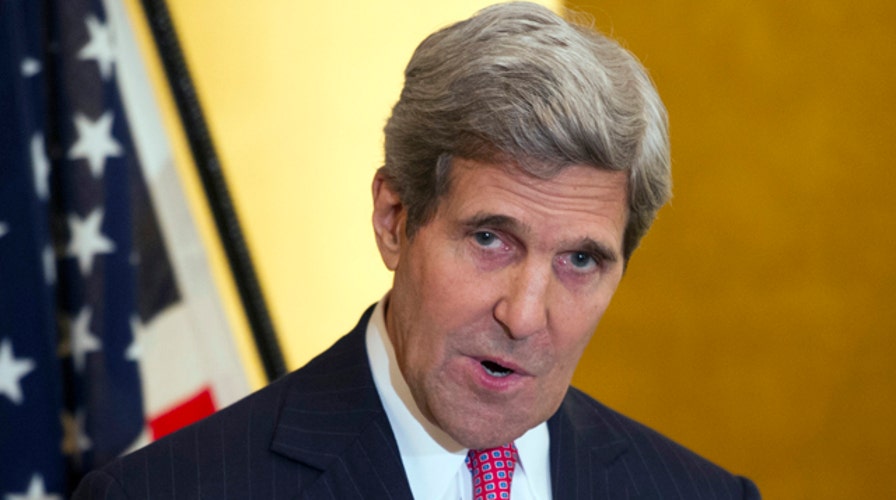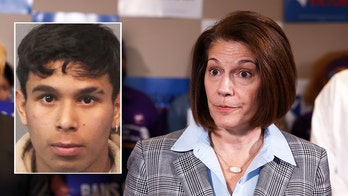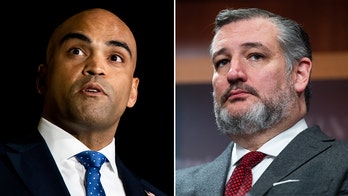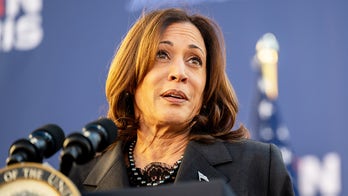Secretary Kerry: More sanctions on Iran would be a 'mistake'
Reaction from Fox News contributor Lisa Daftari
WASHINGTON – The Obama administration’s efforts to strike a diplomatic deal with Iran over its nuclear program is running into growing criticism on Capitol Hill, with one top lawmaker expressing concern that Secretary of State John Kerry may be willing to give up too much just to say he’s got a deal.
Sen. Lindsey Graham, R-S.C., among the lawmakers who met with Kerry Wednesday afternoon on Iran, charged that the administration “wants a deal too badly.”
“What is your endgame here?” Graham said he’d ask Kerry. “What I want John to tell me is, ‘How does this movie end?’”
Kerry met with members of the Senate Banking, Housing and Urban Affairs Committee behind closed doors Wednesday afternoon. His goal was to calm bipartisan concerns and calls by some lawmakers to tighten existing sanctions against Iran.
Ahead of the meeting, Kerry warned Congress against scuttling a historic opportunity for a nuclear pact with Iran by pressing ahead with new sanctions.
"We put these sanctions in place in order to be able to put us in the strongest position possible to be able to negotiate. We now are negotiating," Kerry told reporters ahead of testifying before the Senate Banking Committee. "And the risk is that if Congress were to unilaterally move to raise sanctions, it could break faith in those negotiations, and actually stop them and break them apart."
Almost everyone involved wants Iran to stop enriching uranium, and almost everyone in Congress agrees they'd prefer diplomacy to a military strike. But that's where the similarities end.
President Obama's disagreement with Congress is more about strategy than end result.
Initially, the Obama administration offered Iran the opportunity to recoup some of the billions of dollars in frozen overseas assets if the country started the process of shutting down its nuclear program.
The White House also said that the most severe sanctions would remain in place until the country is able to convince the world it is not trying to assemble a nuclear arsenal.
Many experts believe that in order to strike a deal with Iran diplomatically, the international community will have to ease economic sanctions against Tehran.
A deal looked likely last week between the international community and Iran over its nuclear program.
At the time, Israel came out defiant and outraged over a possible agreement – one Israeli Prime Minister Benjamin Netanyahu called the “deal of the century” for Tehran.
But despite Iran’s nuclear negotiator signaling progress between Tehran and six world powers last Thursday, no deal was reached. Kerry was among the leaders that had gone to Geneva to hammer out the deal. International talks on Iran are set to resume Nov. 20 in Geneva.
“We are still determining if there’s a diplomatic path forward,” State Department Spokeswoman Jen Psaki said Tuesday. “What we are asking for right now is a pause, a temporary pause, in sanctions. We are not taking away sanctions. We are not rolling them back. This is about ensuring that our legislative strategy and our negotiating strategy and running hand in hand.”
Last week’s diplomatic fail ramped up concerns in Congress that a deal was out of reach.
Sen. Ted Crus, R-Texas, called the plan on the table a “terrible deal.”
"It wouldn't stop Iran from developing nuclear weapons, it lets them keep their centrifuges, keep their enriched uranium. That was a mistake,” he told Fox News.
The Israeli Embassy told FoxNews.com Wednesday they were taking a wait-and-see stance and are deferring all comments to Netanyahu.
But other powerful lobbying groups like the American Israel Public Affairs Committee aren’t staying silent.
“AIPAC continues to support congressional action to adopt legislation to further strengthen sanctions, and there will absolutely be no pause, delay or moratorium in our efforts,” President Michael Kassen said in a statement earlier this month.
If a diplomatic agreement is reached, AIPAC has indicated it would launch an aggressive campaign against it.
Fox News' Chad Pergram and James Rosen and The Associated Press contributed to this report.





